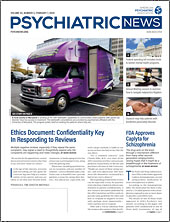Someone dear to me has developed a neurological illness that affects her cognition. Although she is aware of some of her deficits, she has a curious neglect of others, reminiscent of hemineglect after a right-sided stroke, but in her case it’s not about paralysis. A brilliant researcher, she’s struggling to complete the final grant of her career. Fortunately, she has help from her team, and the grant will be submitted through a group effort.
The process of witnessing this makes me wonder, “What if this happened to me?” I want a mechanism to create an auxiliary observing ego in case my internal one fails. According to the Association of American Medical Colleges, over one-third of U.S. physicians are 55 years or older and likely to retire in the next decade. Presumably I am not the only physician thinking about the effects of aging on my ability to practice.
I told a colleague that if I ever become cognitively impaired and don’t realize it, she is to bluntly insist that I stop seeing patients. She replied, “Put it in writing.” That got me thinking: We have advance directives about resuscitation and medical treatments and psychiatric advance directives about how to handle the next psychotic or manic episode, but no advance directives about occupational fitness.
A query of three search engines did not identify any specific reference to occupational or employment advance directives. What might such occupational advance directives (OAD) entail? I looked for guidance in medical and psychiatric advance directives resources. AARP has a directory of state-specific legal documents for medical advance directives, and SAMHSA provides a guide to psychiatric advance directives (see end of articles for links to these forms and information).
Borrowing elements from both of these directives and a contingency plan that I developed, I wrote my own OAD. My OAD designates three colleagues and my spouse as advisers because I could imagine disregarding one colleague’s expression of concern, but the concern of two or three people is likely to pierce the veil of denial.
An OAD should contain declarations about the person’s intentions and preferences. For example, one could distinguish different courses of action depending on whether cognitive impairment was likely to be temporary (say, for the duration of a treatment protocol) or permanent. Courses of action could include referral to the state physician health program, neuropsychological screening and/or testing, a leave of absence from work, or permanent cessation of practice. If the person has a contingency plan document, this could be the time to put it into practice. Alternatively, the OAD could include sample letters to patients for each of these hypothetical circumstances, as well as specific instructions about how to manage or close the practice and who would be in charge of which elements (notification and transfer of patients, management of medical records, disposition of the physical office and its contents, and so on). It should include signatures of the person who is declaring the OAD and the advisers designated by the document, and each of these parties should receive a copy.
The OAD is a logical extension of medical ethics principles. It supports nonmaleficence, the imperative to refrain from harming patients through misconduct or negligence, by ensuring that a cognitively impaired physician receives appropriate medical attention and refrains from practice during a period of impairment. When combined with a contingency plan, an OAD protects patients from abandonment. It upholds the virtues of diligence, self-awareness, and openness to feedback. Furthermore, it protects the physician’s autonomy by voluntarily setting up parameters for seeking evaluation and/or stepping out of practice, rather than waiting for a bad patient outcome or a licensing board complaint.
Having an OAD eases the burden on colleagues and family who might otherwise struggle with how to manage a physician’s medical decline if he or she was in denial about it. As a further benefit, this auxiliary observing ego spares physicians a measure of humiliation by avoiding their being perceived by patients or other professionals as practicing in an impaired state.
I would never want to be in a position in which impaired judgment could lead to a poor treatment decision that harmed a patient. Nor would I want a patient to feel worried about or embarrassed by any change in my functioning. Like similar documents, an OAD is something I hope never needs to be invoked, but I feel better for having one in place. ■
The author thanks Deb Stetler, M.D., for valuable contributions to this article.
AARP’s Advance Directives Forms are posted
here. A Practical Guide to Psychiatric Advance Directives is posted
here.

